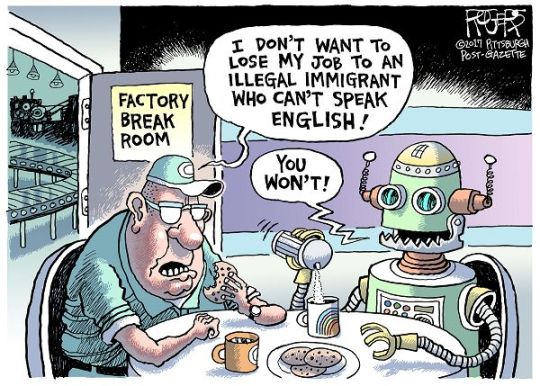Quote
When we talk about millennial student debt, we’re not just talking about the payments that keep millennials from participating in American “institutions” like home ownership or purchasing diamonds. It’s also about the psychological toll of realizing that something you’d been told, and came to believe yourself, would be “worth it” — worth the loans, worth the labor, worth all that self-optimization — isn’t.
How Millennials Became The Burnout Generation - Anne Helen Petersen
14 notes
·
View notes
Quote
The crisis affected everyone in some way, but the way it affected millennials is foundational: It’s always defined our experience of the job market. More experienced workers and the newly laid-off filled applicant pools for lower- and entry-level jobs once largely reserved for recent graduates. We couldn’t find jobs, or could only find part-time jobs, jobs without benefits, or jobs that were actually multiple side hustles cobbled together into one job. As a result, we moved back home with our parents, we got roommates, we went back to school, we tried to make it work. We were problem solvers, after all — and taught that if we just worked harder, it would work out.
On the surface, it did work out. The economy recovered. Most of us moved out of our parents’ houses. We found jobs. But what we couldn’t find was financial security. Because education — grad school, undergrad, vocational school, online — was situated as the best and only way to survive, many of us emerged from those programs with loan payments that our postgraduation prospects failed to offset.
How Millennials Became The Burnout Generation - Anne Helen Petersen
#truthbomb#perspective#millenials#debt#student loans#youarenotaloan#student debt#jobs#secuirty#career
3 notes
·
View notes
Quote
Financially speaking, most of us lag far behind where our parents were when they were our age. We have far less saved, far less equity, far less stability, and far, far more student debt. The “greatest generation” had the Depression and the GI Bill; boomers had the golden age of capitalism; Gen-X had deregulation and trickle-down economics. And millennials? We’ve got venture capital, but we’ve also got the 2008 financial crisis, the decline of the middle class and the rise of the 1%, and the steady decay of unions and stable, full-time employment.
How Millennials Became The Burnout Generation - Anne Helen Petersen
2 notes
·
View notes
Photo
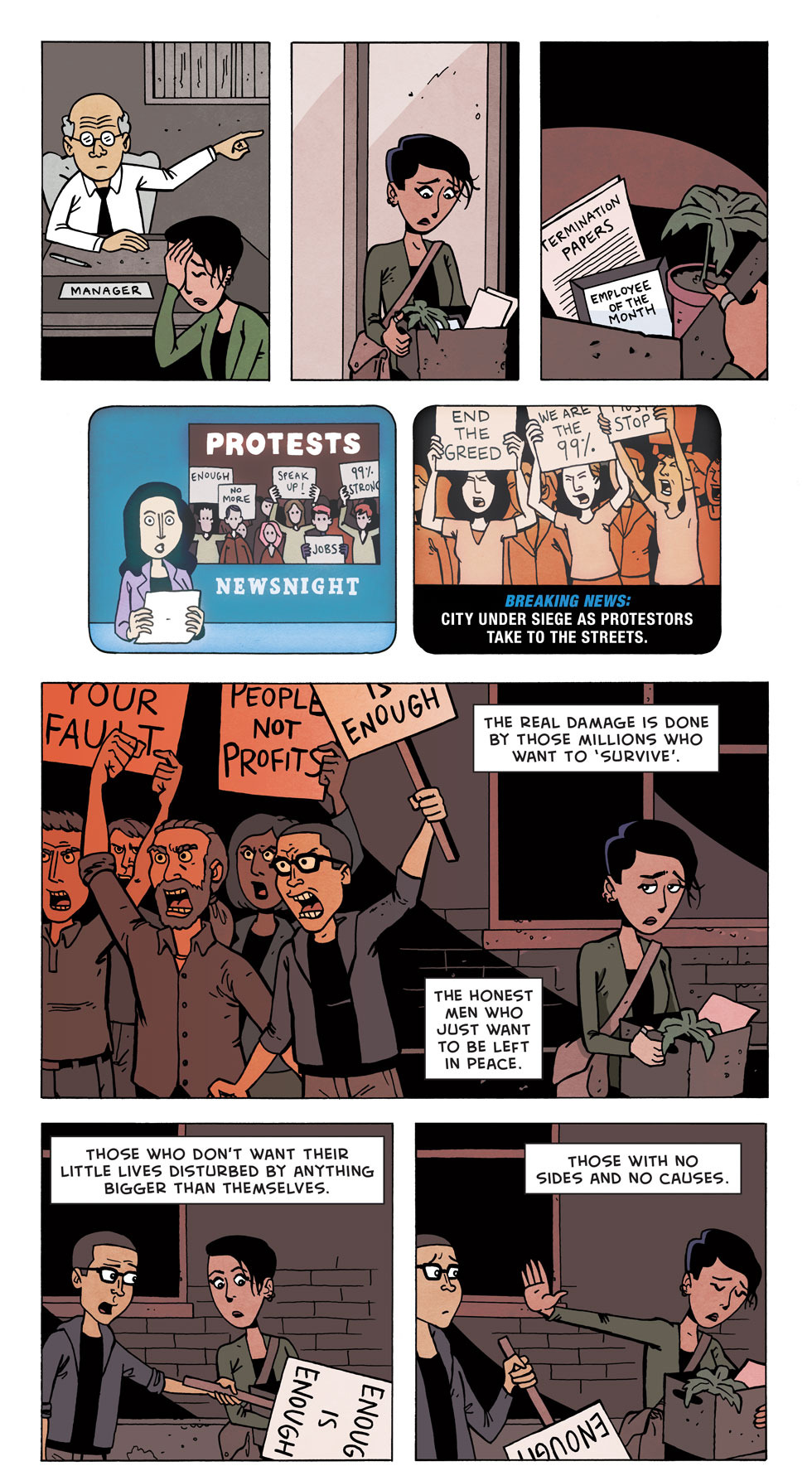
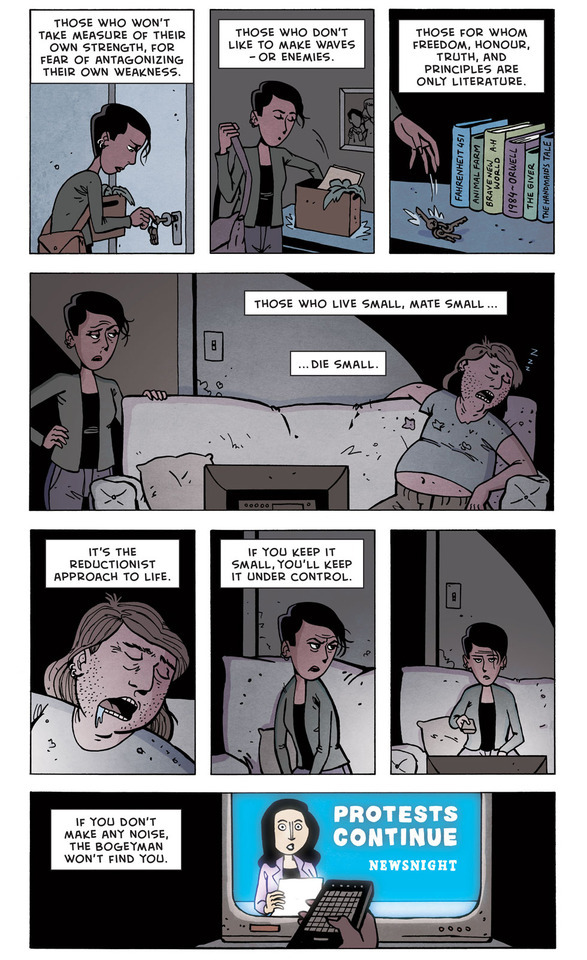
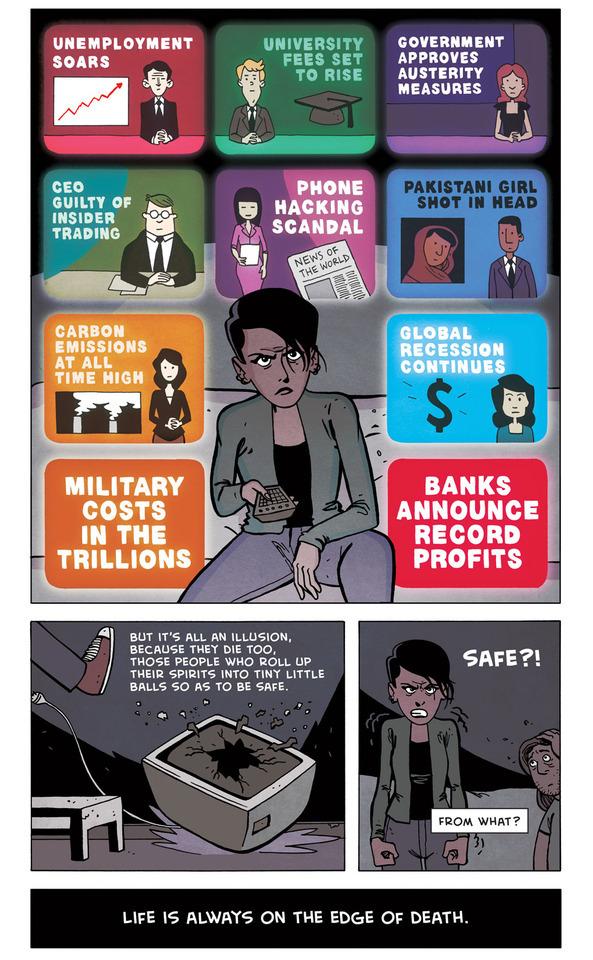
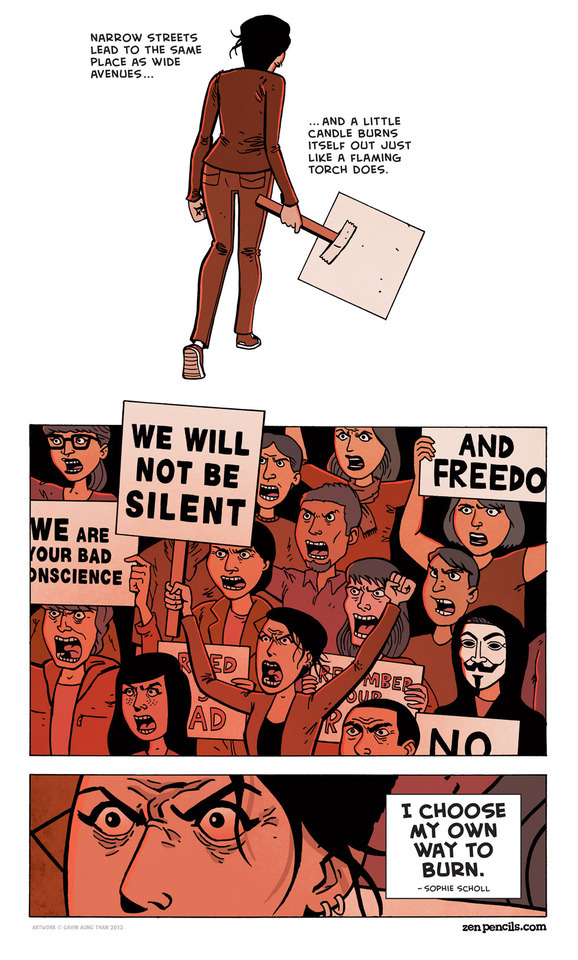
“The real damage is done by those millions who want to ‘survive’. Those with no sides and no causes.”
Today marks the 75th anniversary of the death of Sophie Scholl, a German activist who spoke out against the Nazi regime and was a member of a non-violence protest group called The White Rose. The group mainly consisted of students in their early twenties who opposed the fascist rule of the Nazis and distributed leaflets urging their fellow Germans to oppose the regime through non-violent resistance. On 22nd February 1943, after the release of the sixth White Rose leaflet, Sophie was arrested by the Gestapo, convicted of treason and executed that same day by guillotine. She was 21 years old.
12K notes
·
View notes
Quote
You can’t found a new faith system with the words “I am publishing a very good vegetarian cookbook”. For this, you need something stronger. You need the assurance of make-believe, whispered sweetly. Grind this cauliflower into tiny pieces and you can make a special kind of no-carb rice! Avoid all sugar and your skin will shimmer! Among other things, clean eating confirms how vulnerable and lost millions of us feel about diet – which really means how lost we feel about our own bodies. We are so unmoored that we will put our faith in any master who promises us that we, too, can become pure and good.
Why we fell for clean eating - Bee Wilson
#truthbombs#think different#diet#marketing#fugazi#make believe#myths#body#health#lifestyle#food#clean food#organic#vegetarian#faith
4 notes
·
View notes
Photo





The Phenomenon Of “Crown Shyness” Where Trees Avoid Touching
131K notes
·
View notes
Photo




A Gigantic Buddha Statue Emerges from the Top of a Hill in Japan
2K notes
·
View notes
Photo







7 Most Spectacular ‘Mirror Room’ Installations by Yayoi Kusama
515 notes
·
View notes
Quote
In significant ways, the calculus of quitting changes workplace dynamics. Being a good manager now means helping those whom you manage acquire the skills that will help them to leave for a better job at another company. Good managers know this. I observed a Berkeley continuing education workshop for new managers, and one speaker described her strategies for behaving well to her team. She explained that she did this from the outset by clarifying what she understood their implicit business contract to be. She takes each new member of her team out to lunch in the week they start: ‘So I always say things like: “You don’t work for me, I work for you… My job is to make sure you can do your job well. And one day, you are going to leave this job, right, our careers are long, and we will have many jobs along the way. When you want to leave this job, I hope to be here to help you move on to this next job.”’ From the outset, managers say that they will help those who work under them become job-quitters – to find the next best stepping stone in their career.
The quitting economy - Ilana Gershon
#think different#jobs#careers#mentors#truthbombs#work#perspecitive#wisdom#quitters#i quit#advice#neoliberalism#management
3 notes
·
View notes
Quote
Here's what I realized. Basically, the unofficial philosophy of the Democratic Party is meritocracy, as defined by education. Everybody gets what they deserve, and what they deserve is defined by how they did in school. This is pernicious doctrine in all sorts of ways, but one of the most pernicious ways is that there is no solidarity in a system like that between the people at the top and the people lower down in the hierarchy. This is killer.
What's The Matter With Democrats? Thomas Frank Explains
#truthbombs#thomas frank#democratic party#think different#meritocracy#education#ivy league#higher ed#news#politics#democrats
1 note
·
View note
Quote
There is another option that I eventually figured out while I was writing this book because the first thing I did was to say, "Well, look, government by expert has, is failing us, you know?" I'd dig around in the past. Has it ever worked? The first thing you come across is the book you mentioned, "The Best and the Brightest," when the exact same thing happened during Vietnam, where you have these experts from, and again, they're mostly from Harvard, but from various other Ivy League institutions. It's the same problem. They won't listen to voices from outside their discipline, and they show this extraordinary deference to one another, to the people at the top.
Then I say, "Well, has there ever been a time when it worked?" This is where it gets interesting because, of course, there is. Government by expert has worked. The Roosevelt administration. They call them The Brain Trust. It worked very well. They pulled us out of the Depression. They won World War II. These guys were awesome. I start digging around. Who were these guys? Here is the fascinating thing. They were brilliant, but they came from all different walks of life. They weren't all these highly credentialed academic authorities. That's not what they were. This is the thing that you finally realize. There are highly intelligent people all over America, from all sorts of backgrounds, in all sorts of different industries. The best minds in banking aren't necessarily at Goldman Sachs…
What I discovered also is there is a lot of pathologies of professionalism. We had been talking about one of them, which is that they show this deference to one another at the top. Another is that they don't listen to voices from outside their discipline.
What's The Matter With Democrats? Thomas Frank Explains
#think different#truthbombs#best and brightest#smart#credentials#education#ivy league#elites#thomas frank
0 notes
Quote
If you are a white-collar worker, it is simply rational to view yourself first and foremost as a job quitter – someone who takes a job for a certain amount of time when the best outcome is that you quit for another job (and the worst is that you get laid off). So how does work change when everyone is trying to become a quitter? First of all, in the society of perpetual job searches, different criteria make a job good or not. Good jobs used to be ones with a good salary, benefits, location, hours, boss, co-workers, and a clear path towards promotion. Now, a good job is one that prepares you for your next job, almost always with another company.
Your job might be a space to learn skills that you can use in the future. Or, it might be a job with a company that has a good-enough reputation that other companies are keen to hire away its employees. On the other hand, it isn’t as good a job if everything you learn there is too specific to that company, if you aren’t learning easily transferrable skills. It isn’t a good job if it enmeshes you in local regulatory schemes and keeps you tied to a particular location. And it isn’t a good job if you have to work such long hours that you never have time to look for the next job. In short, a job becomes a good job if it will lead to another job, likely with another company or organisation. You start choosing a job for how good it will be for you to quit it.
The quitting economy - Ilana Gershon
#jobs#careers#truthbombs#think different#money#wisdom#perspective#career#skills#economy#work#ilana gershon
3 notes
·
View notes
Quote
The calculus of quitting also changes the nature of being co-workers, and not just because they are jockeying over who does which tasks in a new way. While you might always have wanted to get along with your co-workers, the quitting economy introduced a new instrumental reason why collegiality is especially important. Now that people aren’t supposed to stay all that long at a company, you experience a regular turnover in your workplace. Workers who used to get ahead by impressing their managers by being steady, self-effacing and conscientious no longer have the time to establish the appreciative audience they used to within a company. As a result, these types of workers might no longer be steadily promoted. If their co-workers appreciate them, however, then they might, when it comes time for them to look for their next job, have supporters at other companies. After all, everyone works in the quitting economy, and everyone knows it, creating a different incentive for people to get along with their co-workers. Today, when every job opening has too many applicants, having an insider in the company who can be an ally can make all the difference.
The quitting economy - Ilana Gershon
#economy#truthbombs#jobs#think different#careers#advice#wisdom#perspective#change#networking#promotions#work
1 note
·
View note
Quote
In general, to keep stock prices high, companies not only have to pay their employees as little as possible, they must also have as temporary a workforce as their particular business can allow. The more expendable the workforce, the easier it is to expand and contract in response to short-term demands. These are market and shareholder metrics. Their dominance diminished commitment to employees, and all other commitments but to shareholders, as much as the particular industry requirements of production allow. With companies so organised, the idea of loyalty receded.
Companies now needed to free themselves as much as possible of long-term obligations, such as pensions and other worker incentives. Employees who work long, and in many cases, intense hours to finish short-term projects, became more valuable. While companies rarely say so explicitly, in practice they often want employees who can be let go easily and with little fuss, employees who do not expect long-term commitments from their employer. But, like employment, loyalty is a two-way street – making jobs short-term, commitment-free enterprises leads to workers who view temporary work contracts as also desirable. You start hiring job-quitters.
The CEO of Me, Inc is a job-quitter for a good reason – the business world has come to agree with Hayek that market value is the best measure of value. As a consequence, a career means a string of jobs at different companies. So workers respond in kind, thinking about how to shape their career in a world where you can expect so little from employers. In a society where market rules rule, the only way for an employee to know her value is to look for another job and, if she finds one, usually to quit.
The quitting economy - Ilana Gershon
#truthbombs#think different#jobs#mcjobs#career#advice#wisdom#money#careers#job hopping#i quit#neoliberalism#economy#news
33 notes
·
View notes
Quote
The smaller indignities are numerous. At the end of every shift, Nicole watches large amounts of leftover food go into the compost – food that she’s not allowed to take home. Cafeteria workers only enter Facebook’s medical clinics if they’ve been selected for a mandatory drug test. Facebook recently held a “Bring your kids to work” day, but cafeteria workers’ children were not allowed.
A spokeswoman for Facebook said that none of the company’s contingent or contract workers have access to facilities such as clinics, gyms, or bring your kid to work days, but that other policies were a matter between the contractor and the workers.
Facebook worker living in garage to Zuckerberg: challenges are right outside your door
#think different#jobs#american dream#facebook#truthbombs#money#pvoverty#zuck#zuckerberg#tech#careers#contractors#gigs#economy#california#broke
0 notes
